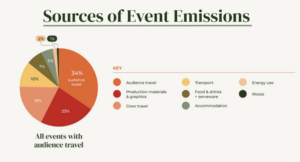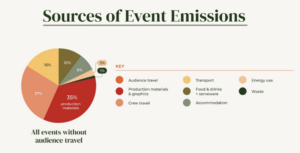As a business we are committed to delivering sustainable catering. It’s ingrained in everything that we do and the entire team is encouraged to think creatively and take responsibility in reducing our environmental impact. One of our administrators, Becky Pearson has taken a keen interest in sustainability, participating in isla’s training sessions and carrying out research to find out more. Here, Becky shares details of the Carbon Literary Project with us.
According to the Carbon Literacy Project, Carbon Literacy is defined as “An awareness of the carbon costs and impacts of everyday activities, and the ability and motivation to reduce emissions, on an individual, community and organisational basis”. This involves understanding the causes and impacts of our everyday carbon emissions. Businesses that work with the Carbon Literacy Project include the NHS, ITV and BBC, and BAFTA (all clients of ours).
As an events catering business, there are a number of sources from which we produce emissions that we need to be aware of, and make a conscious effort to reduce, where possible. The below graphics show the sources of events emissions, both with and without audience travel, from January 2022 to January 2023:


From this, we can pinpoint the areas which produce the largest emissions, and work towards reducing this. We obviously have little to no control over audience travel, but we are certainly responsible for the portion of the ‘Crew Travel’ statistic. In order to claim that we are ‘carbon literate’, we would have to make a conscious effort to reduce crew travel to our jobs – this may include using crew that is local to the area in which the event is taking place, which would in turn, reduce our portion of the ‘Accommodation’ statistic.
This is clearly easier said than done, with a number of our regular jobs being overseas or in remote locations, like Team GB and Isle of Wight Festival, but making a few simple changes can have a big impact. For example, we utilise public transport, try to carpool and use electric vehicles wherever possible. This reduces our emissions.
As a catering business, we also need to be aware of the impact our food waste has on our carbon emissions. Despite the statistic above suggesting that only 1% of emissions from events is from “waste”, roughly 1/3 of the world’s food is wasted – that’s 1.3 billion tons of food suitable for human consumption every year! You might ask how food waste contributes to greenhouse gases, but all this wasted food produces the equivalent emissions to adding 33 million extra passenger vehicles to roads! In this industry, food waste is inevitable, but in order to claim carbon literacy, business owners must come up with ways in which to either avoid the waste in the first place, or to distribute any leftovers.
Being Carbon Literate isn’t about becoming ‘Net Zero’, which means ‘reducing our total greenhouse gas emissions by 90% before offsetting any residual emissions’ – it is merely the appreciation that we do create emissions in everything we do and putting practises into place with the aim of reducing those emissions as much as possible. Eat to the Beat work closely with isla, who specialise in making the events industry more sustainable, and are training a number of our staff to spot which of our practises create the most emissions and how to change and adapt in order to make our business more sustainable in the future.


